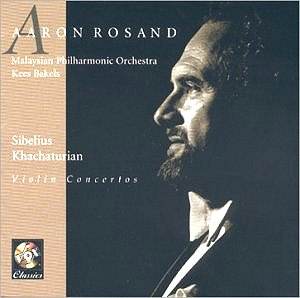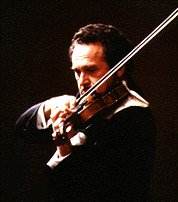SIBELIUS
Violin Concerto [30.18]
KHACHATURIAN
Violin Concerto [35.31]
 Aaron Rosand
(violin)
Aaron Rosand
(violin)
Malaysian PO/Kees Bakels
rec Dewan Filharmonik Petronas Towers, Kuala Lumpur, Malaysia, December
1999
 VOX VXP 7904
[65.58]
VOX VXP 7904
[65.58]
Vox

Rosand (now in his early 70s) has stood to one side from the hurly-burly
of lionising coteries. One has the impression that his independence of outlook
may have cost him 'friends' in high places. Rosand's own furrow is evident
from his discography which includes concertos by Wieniawski, Hubay, Joachim,
Godard and Arensky. He has not neglected the classics though many of these
were recorded after his forays into the romantic reaches of the nineteenth
century shelving.
His background is well worth noting. Born 15 March 1927, Hammond, Indiana.
His orchestral debut was with the Mendelssohn concerto with Frederick Stock
and the Chicago SO. His first teacher was Leon Sametini. Later he worked
with Efrem Zimbalist. He was often called on to deputise to cover the illnesses
of more celebrated fiddlers. After Menuhin fell ill he stepped in at a concert
given by the ill-graced Fabien Sevitsky with the Indianapolis SO. The work
was the Bruch concerto. When Szigeti cancelled a concert with the Little
Orchestra of New York conducted by Thomas Scherman his offer to deputise
was accepted. He had never played the programmed works (the Busoni concerto
and Berlioz's Reverie and Caprice) so first he had to find the scores.
This took him two days. He then had five days of 24 hour day practice before
the concert which seems to have gone well. The Barber was the work of choice
for his New York Phil debut with Bernstein.
In Sibelius and Khachaturian he is up against the toughest competition. Rosand's
souped-up and blessedly vibrato-free approach to the Russian work is well
matched with Bakels' (already well known from his, currently incomplete,
Vaughan Williams symphony cycle on Naxos). The adrenalin rush delivered at
this speed is not at the expense of thematic definition. There is no blur
and, to Rosand's enduring credit, he terraces the dynamics rather than serving
up a homogeneous mf. He also has the gift of imbuing accompanimental
figures with interest as at 8.19 in the sotto voce playing in the
finale. A tautness and attack hangs over the first and third movements. The
third is taken at a ferociously unforgiving pulse with orchestra and Rosand
in stupendous form. The andante sostenuto is truly remarkable in its
pointful approach where every phrase seems balanced and considered without
compromising spontaneity. Has any violinist ever imbued this movement with
such concentration. Oistrakh (my reference disc BMG-Melodiya 74321 59056-2)
comes closest but even he does not dig as deep. Rosand is no sentimentalist
either. Sentiment however (quite a different thing from sentimentality) is
something Rosand recognises and articulates. The Sibelius is a fine
interpretation in a very large field and will certainly satisfy without
displacing Oistrakh (BMG-Melodiya) or Haendel (EMI).
Recording placement duly accentuates the solo but does so preserving a
naturalistic illusion.
Glorious in the Khachaturian; fine playing in the Sibelius.
Seek out this disc and let's hope for more. I would very much like to hear
Rosand in the Elgar (please take it as broadly as Haendel with Boult on
Testament), Karlowicz, Martinu No. 2, Miaskovsky (very much suited to Rosand),
William Schuman and Moeran.
For now violin fanciers should find this disc and remember the many others
Rosand discs in the Vox catalogue. How extraordinary that Rosand should have
had a partnership with Vox since the 1960s.
Rob Barnett
 (Five for the Khachaturian)
(Five for the Khachaturian)
www.voxcd.com

AARON ROSAND
Career Overview
Legendary international concert violinist for more than half a century and
has recorded more than 150 individual compositions. Trained in the classical
19th-Century style of romantic violin music, Rosand has studied and/or performed
with such musical greats as Efrem Zimbalist, William Steinberg, Leonard Slatkin,
Mstislav Rostropovich, Lorin Maazel, Fritz Reiner, Leonard Bernstein and
Erich Leinsdorf.
Currently performing and recording at the prime age of 73. Recently released
his 20th album, Sibelius & Khachaturian Violin Concertos. Also serves
as the Dorothy Richard Starling Chair of Violin Studies at the prestigious
Curtis Institute of Music in Philadelphia, a position Rosand has held since
1981.
Notable Highlights
Began playing the violin at the young age of 3. At 9-years old, the musical
prodigy made his first recital debut at Chicago's renowned Civic Opera House.
Won a Chicago Musical College scholarship at the age of 12 where he was taught
by famed violin instructor Leon Samenti. In 1948, made professional debut
in New York and performed more than 30 recitals for the National Civic Concerts.
Has made premier recordings of concertos by Joachim, Hubay, Ernst, Arensky,
Godard and the complete Humoresques by Sibelius.
Recorded all of Beethoven's works for piano and violin with his first wife
Eileen Flissler in 1961, which was praised by The New York Times as one of
the all-time best-selling violin records.
Background
Birthdate:
Born March 15, 1927 in Hammond, Indiana to professional musicians (cabaret
singer and cinema pianist)
1930: At age 3, began an intensive study of the violin.
1936: First recital debut at Chicago's Civic Opera House at the age of 9.
1937: At 10, performed the Mendelssohn Concerto at the Chicago Symphony with
acclaimed conductor Frederick Stock.
1939: At 12, studied under famed violin instructor Leon Sametini at the Chicago
Musical College. Sametini studied under the world-renowned violinist Eugene
Ysaye, and passed his knowledge of the late performer's teachings on to Rosand.
1944: Rosand becomes a student of critically acclaimed violinist Efrem Zimbalist
at Philadelphia's Curtis Institute of Music.
1945: Left the Curtis Institute for 18 months of Special Services with the
US Eighth Army in Japan. Upon his return in 1947, Rosand was noticed by National
Concert and Artist Corporation, a competitor of Columbia Artists Management,
Inc (CAMA). With the encouragement of NCAC, Rosand began his extensive career
as a concert violinist.
1948: Made first professional debut at New York's Town Hall December 27,
1948. First season included more than 30 recitals for National Civic Concerts.
Became known as the 'pinch-hitter' for performing any of 20 concertos at
a moment's notice.
1957: Recorded an LP of the Brahms Sonatas Opus' 78 and 100 with the late
pianist Eileen Flissler, Rosand's first wife.
1960: Debuted at the New York Philharmonic playing the Barber Concerto with
legendary conductor Leonard Bernstein.
1961: Rosand and Flissler recorded all of Beethoven's works for piano and
violin. The New York Times listed the recording as one of the all-time best
selling violin records.
1967: Rosand gave a Carnegie Hall recital of music by the great
violinist-composers: Tartini, Vieuxtemps, Paganini, Sarasate and Ysaye to
favourable reviews.
1970s: Rosand establishes his reputation as a 'virtuoso throwback' at the
annual Romantic Festivals in Indianapolis, playing concertos by Arensky,
Ernst, Joachim, Hubay, Ries and Godard.
1981: Rosand is asked to join his alma mater, the Curtis Institute of Music
in Philadelphia, as the Dorothy Richard Starling Chair of Violin Studies.
He begins to modernize the Russian School of Auer and the Ysaye tradition
for a new generation of students.
1990s: Rosand releases more than 15 albums. He participates in extensive
performances in the United States, Europe and Asia.
2000: Releases 20th album Sibelius & Khachaturian Violin Concertos at
the prime performing age of 73 with classic music label Vox Music Group.
The Khachaturian/Sibelius CD has just become available for pre-purchase at
major online vendors. Rosand's newest album is at a retail price of $9.99
via Tower Records, Amazon.com, CDNow and other music retail outlets. Both
concertos were recorded in Kuala Lumpur, Malaysia in the world's tallest
building, the Petronas Towers concert hall. "I
am both delighted and grateful to be in a position to continue performing
at an age when most of my 20th Century colleagues are retired, or no longer
perform at their recognized level," explains
Rosand, who has collaborated with many great conductors, including Fritz
Reiner and Leonard Bernstein. "I believe that I am playing as well as ever
and I'm looking forward to creating music and performing in front of packed
audiences for many years to come." Rosand, who recently returned from an
extensive concert tour in Asia, plans to record
works by Max Bruch, including the "Scottish Fantasy",
Concerto in G minor, and a Romance Op. 42 , with the NDR (Norddeutschen Rundfunk)
in Germany this December. The recording is scheduled for release in 2001.
The master musician's upcoming live performances includes a January 28, 2001
concert at the Jascha Heifetz Society in Los Angeles and a performance of
the Beethoven Violin Concerto at the National Gallery of Art in Washington,
D.C., June 2, 2001.
Vox Music Group, Inc. is located at 95 Oser Avenue, Hauppauge, NY 11788.
Web: http://www.voxcd.com. For more information on the Vox Music Group, please
contact General Manager Todd Landor at (631) 231-7947 or email info@voxcd.com.

